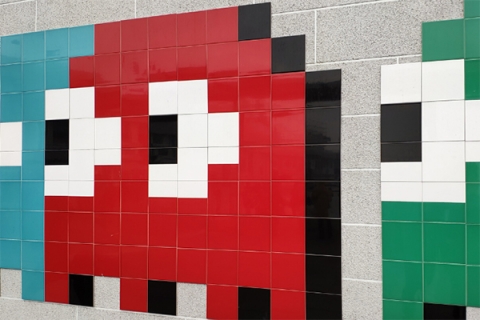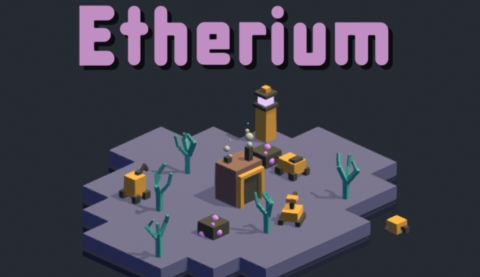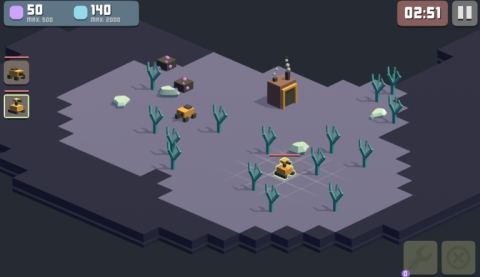

Learn more about first-year Computer Games Technology student Kian Bennett
5 min read
During normal term-time, we the Creative Careers team, organise a regular schedule of talks and events with exciting industry professionals. Last year we invited Grads in Games to talk about their exciting Sumo Digital Rising Star competition. First-year Computer Games Technology student, Kian Bennett, attended this event and decided to enter the challenge. Read on to find out how he got on and learn more about this annual opportunity…
Tell us about the ‘Rising Star’ Award?
Search For A Star and Sumo Digital Rising Star are together one of the biggest game development challenges for students across the UK, with Rising Star being specifically for students who are not yet in their final year of study. There are multiple categories, including art, animation, VFX and programming, and students are tasked to create a project over six weeks based on an industry-approved brief. The top submissions for each category would be invited to the finals where we would sit a mock interview with a panel of industry professionals.
The Grads In Games team, who run the competition, gave a talk with the Creative Careers team at our university about the challenge. I decided it would be a great opportunity to practice my game development skills and to add a piece to my portfolio. They have been incredibly supportive throughout the entire competition process and beyond.
How did the challenge go?
The programming challenge is split into two parts – building a game in the Unity engine from a base project, and a C++ code test. The game project was marked in two ways: a gameplay review and a technical assessment. My game Etherium came 2nd in gameplay and 1st for technical, resulting in being the highest-rated project overall. This along with a not-too-terrible code test result meant I was asked to attend the finals in April in front of developers from TT Odyssey, Sumo Digital and Fortitude Games.
The code test was of the same standard given at graduate job interviews and, since I didn’t have much experience with the language before uni, effective preparation was important. I was fortunate that I had an exam for my C++ programming module at around the same time, making it easier to prepare for and allowing me to get high marks in both.
You can watch the moment Kian’s placing was announced here.
What was the most challenging part of your experience?
The game project ran from mid-December up to the end of January, so the biggest challenge was fitting the project work around my uni deadlines. I ended up submitting my project just ten minutes before the deadline, so my time management could certainly have been better.

Etherium, Kian’s entry

Etherium gameplay
What did you enjoy the most?
By far, the most enjoyable aspect of the experience was being able to share my work with industry professionals and to hear what parts they enjoyed and receiving the feedback they left on how I could improve. Game development is something I’m incredibly passionate about, and I love being able to discuss it with those in industry.
How did you feel on the day of the finals?
This was my first interview in this field in front of industry professionals, including a technical director and lead programmer, so I was understandably nervous! The Grads In Games team were ready to help with interview prep, and I was able to reach out to university staff and alumni for valuable advice.
What was the jury like?
The interviewers were wonderful – they were really interested in the challenges I faced with the project and my solutions to them. It was fascinating to get a professional’s insight into the problems I had and gratifying when they approved of the solutions I had come up with. We also discussed my work at university and the plans I have for my career.
What have you gained from the experience?
I think the most valuable take-away from this experience is a better understanding of precisely what knowledge and skills studios are looking for in their developers. I’ve been offered an interview for a programming internship at a games studio as a result of the competition, and I also have a polished piece to add to my portfolio. If nothing else, it’s an excellent opportunity to get my work under the noses of industry professionals and to receive valuable feedback.
What’s next for you?
Next December I’ll be in my second year of uni so I’ll absolutely be entering Rising Star again! It’s around this time that I’ll be looking for an industry placement for the following year, so this competition will hopefully help to broaden my opportunities.
Any tips for students considering taking part next year?
Remember that the planning and pre-production are a key part of the assessment and are a great place to pick up marks, as well as your overall professionalism. Treat it as if it were a university assignment and keep your project’s presentation in mind as it will likely end up on your portfolio!
Specifically for programmers, avoid falling into the trap of focusing too much on the game’s design. While the brief is fairly open-ended and it is tempting to try to make your game as fun and engaging as possible, remember this is a test of your technical skills more than anything. My game had very few interesting or unique gameplay elements but scored highly because I treated it as an opportunity to pack in as many technical bits and pieces as possible.
The most important thing is to be enthusiastic – if you love what you do, it will shine through in your work and your interview!
To see more of Kian’s work click below:
Have your say
If you’re one of our students in the Faculty of Creative and Cultural Industries and have a suggestion for something you’d like us to write about, or you'd like to contribute your own story, please let us know by emailing creative-careers@port.ac.uk.
Enable University alerts
Turn on notifications for critical updates like closures, safety alerts, and urgent service disruptions.





